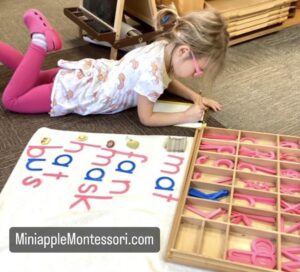 What do parents need to know about Montessori education? If you’re ready to register your child in a Montessori program, or you’re considering this type of school, take a look at the top questions parents have about preschool, the kindergarten transition, and more.
What do parents need to know about Montessori education? If you’re ready to register your child in a Montessori program, or you’re considering this type of school, take a look at the top questions parents have about preschool, the kindergarten transition, and more.
What Is a Montessori School?
Montessori is an educational philosophy that guides a school’s practice. This means instead of a general curriculum or a patchwork of educational approaches that depend on the teacher or school administrators, every Montessori program follows the same set of principles. These principles or the framework of Montessori were, as the name implies, developed by Dr. Maria Montessori.
Hallmarks of Montessori programs include a self- or child-guided approach to learning, multi-age groupings, especially designed educational materials, and the freedom for children to explore classroom content at their own pace and in their own individual ways.
Who Is Dr. Maria Montessori?
How did Montessori education get its name? Dr. Maria Montessori is the founder of this educational philosophy and the creator of the first Montessori school. As an educational pioneer in the 1900’s, Dr. Montessori developed research-based theories that revolutionized academics. Her observations and experiments helped Dr. Montessori to develop a new type of educational philosophy.
Montessori opened her first school in Rome in 1907. This early childhood center focused on under-served students ages three through seven. As Dr. Montessori made more observations and refined the educational approaches used in her programs based on her research, the schools spread from Europe and into America.
Why Are Montessori Classrooms Multi-Age?
Unlike traditional educational programs or daycare centers, Montessori schools use a multi-age grouping approach. You won’t find a classroom with just three-year-olds, a pre-k room of older four’s, or a transitional five-year-old grouping in this type of program. Instead, Montessori schools group children into multi-age rooms that include birth through age three—if the program offers an infant/toddler class—three through age six, and six through age 12 if the program offers an elementary school.
Multi-age classrooms have an educational purpose with developmental benefits for the children. Even though the children in each group are different ages and have different developmental levels, they can come together to form a caring educational community. Older, more developmentally advanced students can help to teach younger students. This helps both older and younger children to build new skills, develop social ties, and learn in different ways.
Not only can older and more advanced students become mentors, they can take advantage of this leadership role and develop a new set of their own skills—including independence, problem-solving, critical-thinking, and communication. Along with peer relationships, the multi-age classroom also encourages positive teacher-student relationships.
Instead of one semester or one year with a teacher, the children in Montessori classrooms spend several years with the same adult educator. This allows the teacher to truly learn about their students and helps the children to bond with their teacher. This type of close and caring relationship breeds a sense of trust and understanding that may not happen in a traditional school program.
What Happens When a Child Reaches Kindergarten Age?
Many children start kindergarten at age five. In Montessori multi-age groupings, a child will reach kindergarten age while they are still in the middle of their preschool or early childhood class. Does this mean they can’t or shouldn’t start kindergarten?
Some Montessori schools do offer a kindergarten program for children who have reached the upper age or developmental level of the early childhood/preschool classroom. Others may wait until the child has aged out of this grouping to recommend that they start grade school.
Whether a Montessori program has a kindergarten room or not, it will prepare your child for the next educational step. From academics to self-confidence and independence, children in Montessori programs develop the skills necessary to succeed in kindergarten and beyond.
Is Montessori the Right Program For Every Child?
There is no real answer to this question. Montessori programs have plenty of benefits that can help most children to learn, grow, and succeed in school. To learn more about Montessori and what it can do for your child, contact Miniapple International Montessori School for more information.

